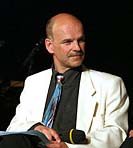Wolfgang Dietrich (political scientist)
Wolfgang Dietrich (born September 13, 1956 in Innsbruck ) is an Austrian peace researcher and political scientist .
Life
Wolfgang Dietrich was trained in Austria and England, received a doctorate in history and German studies at the University of Innsbruck in 1980 and a doctorate in law at the same university in 1984. In 1990 he was appointed university lecturer in political science according to the Austrian UOG. He has completed his habilitation at the Faculty of Sociology and Political Science at the University of Innsbruck and is visiting professor at numerous universities on all continents. In 2015, his home university Innsbruck appointed him honorary professor and the working group of the Alpine countries ARGE ALP made him an ambassador for peace for the Alpine region. In 2017 he became head of the Peace and Conflict Unit and in 2018 co-head of the Research Center for Peace and Conflict at the University of Innsbruck.
Wolfgang Dietrich spent most of the 1980s in Central America . From 1989 to 1991 he was the board spokesman for the Austrian section of Amnesty International . During the 1990s he conducted field research in the Caribbean , India , East Africa and Southeast Asia . From 1995 to 1998 he was director of the European Peace University and from 1995 to 2007 academic director of the Austrian Latin America Institute . He is currently scientific director of the work area, the research center, the MA program for Peace, Development, Security and International Conflict Transformation as well as Chairholder of the UNESCO Chair for Peace Studies at the University of Innsbruck and a member of the Austrian UNESCO Commission.
Research priorities
Wolfgang Dietrich's research focuses on the history of peace research, peace and development, peace and postmodernism, cultures of many peace, peace and world system theory , peace theory , music and peace, and, in the most recent work, on the contribution of humanistic psychology to peace research and conflict transformation .
His most well-known and frequently received contribution to peace research is the Plea for the Many Peace , published in 1998. In this, Wolfgang Dietrich resolves the idea of the one, homogeneous and universal peace in a plurality of many peace and thus establishes an approach that is based on respect is based on otherness, but without deriving the claim to have to understand this otherness in all its nuances or to have to share views. Peace is therefore thought of as a plural noun in the sense of the many peace . What peace means varies from culture to culture on closer inspection, and the connotations and etymological meanings of the word “peace” in different languages are not identical, but rather testify to the diversity of the imaginations and perceptions of the societies that speak these languages. Peace does not mean arriving in a paradisiacal state at the end of all days, but a concrete lived and developed social process.
Transrational Peace and Elicitive Conflict Transformation
In his more recent work, Dietrich distinguishes between five different families of interpretation of peace: the energetic , the moral, the modern , the post-modern and the transrational. He understands transrationality to be the connection between the rational understanding of peace in mechanistic modernity and all those areas of human relationships that do not follow the mind and are nevertheless relevant for the shaping of relationships and conflicts. As such "stratifications" he describes the physical episode, the sexual-familial stratification, the emotional-community, the mental-social, the transpersonal, the transhuman and the epicenter.
On this philosophical basis he opts for elicitive , i.e. conflict transformation generated by the parties to the dispute in their context . Conflict work therefore consists primarily of providing the parties to the dispute with a place to meet and a mode of negotiation that allow them to independently perceive new forms of communication and additional options for action. The elicitive approach, which is derived from the principles of humanistic psychology and has flowed into peace and conflict research through authors such as Paulo Freire , Adam Curle and above all John Paul Lederach, differs fundamentally from the prescriptive approach of the idealistic conflict resolution approaches, which traditionally Dominate the debate in Europe.
Dietrich's new proposal in this context since the turn of the millennium is didactically implemented and practically applied at the Innsbruck School of Peace Research. In practice, it is mainly used and represented by the US peace researcher John Paul Lederach and the school of multitrack diplomacy .
swell
- ^ Wolfgang Dietrich Personal and Professional , University of Vienna, accessed on November 17, 2011
- ↑ http://www.uibk.ac.at/peacestudies/
- ↑ http://www.uibk.ac.at/peacestudies/index
- ^ Austrian Commission for UNESCO
- ^ Plea for the many peace
- ↑ http://www.uibk.ac.at/peacestudies/
Web links
- Site by Wolfgang Dietrich at the University of Innsbruck
- Literature by and about Wolfgang Dietrich in the catalog of the German National Library
| personal data | |
|---|---|
| SURNAME | Dietrich, Wolfgang |
| BRIEF DESCRIPTION | Austrian peace researcher and political scientist |
| DATE OF BIRTH | September 13, 1956 |
| PLACE OF BIRTH | innsbruck |
